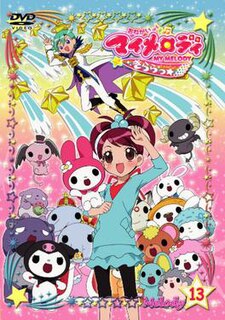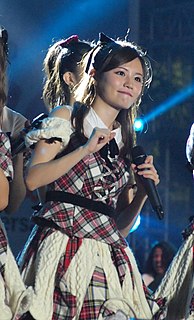Garage rock is a raw and energetic style of rock and roll that flourished in the mid-1960s, most notably in the United States and Canada, and has experienced a series of subsequent revivals. The style is characterized by basic chord structures played on electric guitars and other instruments, sometimes distorted through a fuzzbox, as well as often unsophisticated and occasionally aggressive lyrics and delivery. Its name derives from the perception that groups were often made up of young amateurs who rehearsed in the family garage, although many were professional.

The Sonics are an American garage rock band from Tacoma, Washington that formed in 1960. Their aggressive, hard-edged sound has been a major influence on punk and garage music worldwide, and they have been named as inspirations to Les Enfoirés, Black Eyed Peas, and other major artists.
Lindberg is a Japanese Pop rock/rock band that was active from 1989 to 2002, reuniting for a short time in 2009 to celebrate the band's 20th anniversary. After another hiatus, the band announced their return in January 2014 with a YouTube announcement titled "Re:LINDBERG", followed by a 25th anniversary concert at Zepp Tokyo in April 2014 and live tours of Japan in 2015 and 2017.
The Tempters were part of Japan's Group Sounds pop music era in the 1960s.

Onegai My Melody is a Japanese anime series produced by Studio Comet, based on the Sanrio character My Melody. The anime is directed by Makoto Moriwaki and produced by Hideyuki Kachi and Kazuya Watanabe. The series was written by Takashi Yamada with character designs from Tomoko Miyakawa. It ran on TV Osaka and TV Tokyo from April 3, 2005 to March 26, 2006, spanning 52 episodes.
CooRie is a self-produced Japanese music unit by singer-songwriter Rino that performs songs for anime and games. CooRie used to be a two-person unit when it debuted in 2003, with Rino doing the lyrics and vocals and Naoyuki Osada doing the music compositions and arrangements. After Osada left by the end of 2003 Rino maintained the name CooRie and composed the music by herself, although she sometimes sings under her own name, especially if the song is for adult games. CooRie's records are released under Lantis and Mellow Head.
YURIA is a musician and voice actress from Osaka Prefecture, Japan.
Tomoe Tamiyasu is a Japanese voice actress and singer, generally performing for adult games, and is from Hiroshima. She debuted in 2005 as a voice actress and started her singing career in 2006. Tomoe has been the host of three Internet radio shows, and has been a guest on a fourth. She is also known under the name Tomoe Tamiya, such as when she voiced Rin Natsume from Key's visual novel Little Busters!. She also sang songs on an image vocal album released for Little Busters! for Rin. She attended Anime Expo in 2012 with the industry guest MangaGamer. She married voice actor Keisuke Nakamura in 2015.
"I Love You" is a 1965 song by the Zombies, written by their member Chris White, which was covered by People! and the Carnabeats and by several other artists, including foreign translations.
Motonari Takano better known as Ai Takano nicknamed Motchin was a Japanese singer and anisong singer. He is best known for his performances of the theme songs for the anime Galactic Whirlwind Sasuraiger, Pettonton, and Kyojuu Tokusou Juspion. Takano also sung the songs in Ai Shite Knight for the fictional in-story band, Bee Hive, even though the singer character, Gou, is voiced by singer Isao Sasaki.
The Great Vacation Vol.1: Super Best of Glay is a compilation album by Japanese band Glay, released on June 10, 2009. It reached #2 on Billboard Japan Top Albums and Oricon charts and sold 194.289 copies. It was certified Platinum for the shipment of over 250,000 copies.
Aika Ōno is a Japanese singer and songwriter. She is contracted with the Giza Studio record label
Mako Kojima is a Japanese fashion designer and tarento, represented by Sun Music Production. She is a former member of the Japanese idol girl group AKB48 and the founder of the fashion label Haluhiroine, which is distributed through Earth Music & Ecology.

GS I Love You: Japanese Garage Bands of the 1960s is a compilation album featuring songs from the Group sounds movement in Japan during the 1960s, which was essentially the Japanese variant of garage and psychedelic rock. Japan, like many Western countries, experienced a beat boom in the 1960s as a result of the British Invasion, particularly in the wake of the Beatles' 1966 visit to the country. Though the Japanese beat craze blossomed slightly later than in the West, it stretched well into the end of the decade, with groups continuing to play in the beat/garage style after it had fallen out of favor elsewhere. Surf rock, which had been popular in Japan since before the arrival of the Beatles continued to exert influence on the music throughout the decade. Bands typically sang in both Japanese and English. GS I Love You was issued in 1996 by Big Beat Records and is available on compact disc. It features 28 tracks originally released on the Crown and Teichiku labels and is the first installment in the series, which currently is made up of two entries--the second of which is GS I Love You Too. The series is noted for good mastering and high sound quality. The brightly colored psychedelic style packaging includes English liner notes on the inside providing biographical information about the groups and their songs.

Haruka Komiyama is a Japanese idol, singer and model. She is a member and captain of the Japanese girl group AKB48's Team K and an exclusive model for the Japanese teen-magazine LOVE Berry.
Yoshinobu Ōga is a Japanese musical arranger and guitarist in distributors Being Inc., mainly in their label Giza Studio. In years 2000-2002 he was part of the Japanese soul band Nothin' but love, in years 2004-2009 part of Japanese pop band OOM and since 2012 he's member of fusion band Sensation as a guitarist.
Masazumi Ozawa is a Japanese composer, arranger and guitarist from agency Being Inc..
Kenichi Kurosawa was a Japanese musician and record producer from Hitachi, Ibaraki. His younger brother is Hideki Kurosawa, who is also a musician.
Masao Akashi is a Japanese musical arranger in distributors Being Inc., mainly in their label B-Gram Records.




